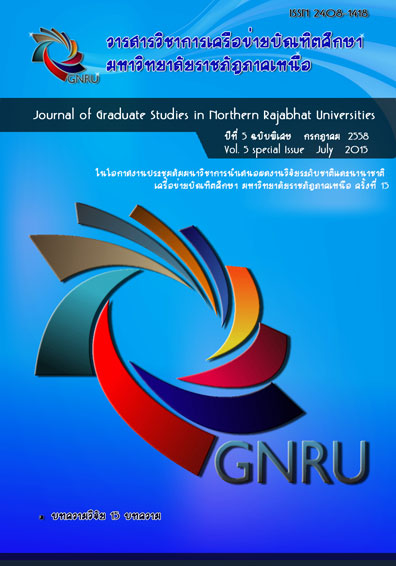ผลการจัดกิจกรรมเสริมประสบการณ์โดยใช้คำคล้องจองที่มีต่อความสามารถด้านการฟังและการพูดของเด็กปฐมวัย; The Effects of Experience by Using Rhyme Words on Listening And Speaking Ability of Early Childhood Children
Main Article Content
Abstract
บทคัดย่อ
การวิจัยในครั้งนี้มีวัตถุประสงค์ (1) เพื่อเปรียบเทียบความสามารถด้านการฟังของเด็กปฐมวัยก่อนและหลังการจัดกิจกรรมเสริมประสบการณ์โดยใช้คำคล้องจอง (2) เพื่อเปรียบเทียบความสามารถด้านการพูดของเด็กปฐมวัยก่อนและหลังการจัดกิจกรรมเสริมประสบการณ์โดยใช้คำคล้องจอง (3) เพื่อเปรียบเทียบจำนวนเด็กปฐมวัยที่ได้รับการจัดกิจกรรมเสริมประสบการณ์โดยใช้คำคล้องจองที่มีคะแนนผ่านเกณฑ์ร้อยละ 80 ของคะแนนเต็มกับจำนวนร้อยละ 70 ของนักเรียนทั้งหมด กลุ่มตัวอย่างที่ใช้ในการวิจัย ได้แก่ เด็กชาย-หญิง อายุ 4-5 ปี จำนวน 20 คน ที่กำลังศึกษาในชั้นอนุบาลปีที่ 1 ภาคเรียนที่ 2 ปีการศึกษา 2557 ของโรงเรียนวัดโพธิ์ศรี สังกัดสำนักงานเขตพื้นที่การศึกษาประถมศึกษานครสวรรค์ เขต 3 จังหวัดนครสวรรค์ ซึ่งได้จากการเลือกสุ่มแบบกลุ่ม เป็นระยะเวลา 8 สัปดาห์ สัปดาห์ละ 3 วัน เครื่องมือที่ใช้ในการทดลอง คือ (1) แผนการจัดกิจกรรมเสริมประสบการณ์โดยใช้คำคล้องจอง (2) แบบทดสอบวัดความสามารถด้านการฟังและการพูด ผู้วิจัยดำเนินการทดลองจัดประสบการณ์กับกลุ่มทดลองกลุ่มเดียว ทดสอบก่อนและหลัง (One group pretest–posttest design) แล้วจึงเก็บรวบรวมข้อมูล นำข้อมูลมาวิเคราะห์ด้วยการทดสอบค่าที (t-test) และการทดสอบไคสแควร์
ผลการวิจัยพบว่า 1. เด็กปฐมวัยมีความสามารถด้านการฟัง หลังสูงกว่าก่อนได้รับการจัดกิจกรรมเสริมประสบการณ์โดยใช้คำคล้องจอง อย่างมีนัยสำคัญทางสถิติที่ระดับ .05 2. เด็กปฐมวัยมีความสามารถด้านการพูด หลังสูงกว่าก่อนได้รับการจัดกิจกรรมเสริมประสบการณ์โดยใช้คำคล้องจอง อย่างมีนัยสำคัญทางสถิติที่ระดับ .05 3. จำนวนเด็กปฐมวัยที่มีความสามารถด้านการฟังและการพูดผ่านเกณฑ์ร้อยละ 80 ของคะแนนเต็มคิดเป็นร้อยละ 70 ของเด็กปฐมวัยทั้งหมดอย่างมีนัยสำคัญทางสถิติที่ .05
Abstract
This research has three purposes: 1) to compare the listening ability of early childhood children before and after the experience by using rhyme words, 2) to compare the speaking ability of early childhood children before and after the experience by using rhyme words and 3) to compare the number of early childhood children who achieved the scores of Listening And Speaking Ability over 80 % and the total number of early childhood children 70 % The sample of this research 20 early childhood children studying in the second semester of kindergarten class 1, academic year 2014 at Wadposee School, under the Nakhonsawan Office of Education Area, The samples were research by mean of cluster random sampling. The research instruments used consisted of 1) the plan for experience by using rhyme words, 2) the test for Listening And Speaking Ability Of Early Childhood Children. The researcher on experience setting was carried out for one experimental group using one group pretest – posttest design. The next step was data collection the data was analyzed using t-test value and Chi – Square test.
Research findings were as follows: 1. the early childhood children who received the experience by using rhyme words to listening ability was higher from posttest scores than the pretest score with a statistic significantly at .05 lavel. 2. the early childhood children who received the experience by using rhyme words to speaking ability was higher from posttest scores than the pretest score with a statistic significantly at .05 lavel. 3. Not less than 70 % of the early childhood children for the listening and speaking ability of scores passing the 80 % criterion. The statistic significantly at .05 level.


